 |
Convert ASF to BMP Sequence
|
The BMP file format, also known as bitmap image file or
Device Independent Bitmap (DIB) file format or simply a bitmap, is a raster graphics
image file format used to store bitmap digital images, independently of the display
device (such as a graphics adapter), especially on Microsoft Windows and OS/2
operating systems. The BMP is stored uncompressed; so it's a lossless image format,
but file size is very big.
ASF to BMP Converter Software converts ASF to BMP sequence files.
With the software, you could get every frame image of ASF in BMP format. The
converter software also supports other output image formats such as JPG,
PNG, and TIFF. You can convert only a part of ASF to BMP instead of the entire
file. And you can set how many frames per second to be extracted with the software.
The output BMP files look something like this.
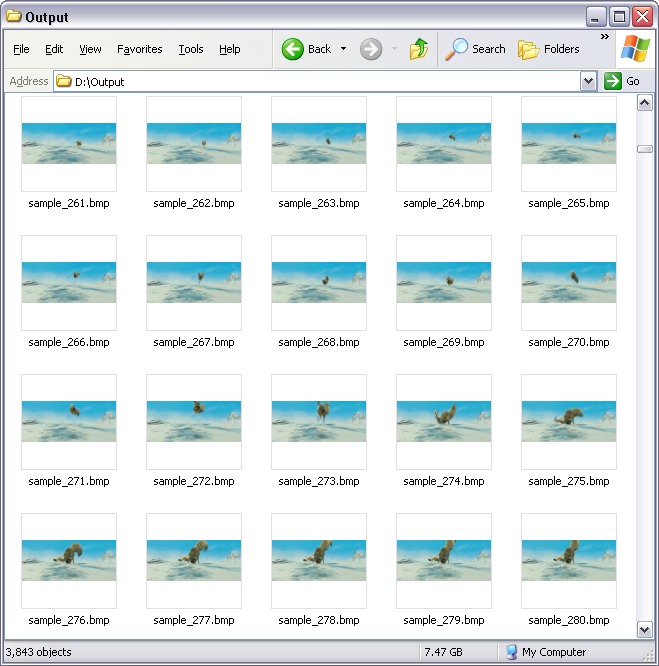
The software also supports other formats and portable devices such as DivX, Windows Phone, JPG image sequence, iPhone, AIFF, MP3, AC3,
etc. The software could convert FLV to iPad, WMV to M4B (MPEG-4 audiobook), VOB to FLAC, MOD to 3GP, TS to Windows Phone, and so on.
ASF to BMP Software supports batch conversion and, is compatible
with Windows 10/8/7/Vista/XP/2000.

What is ASF?
ASF stands for Advanced Systems Format. Windows Media Audio (WMA) and Windows
Media Video (WMV) are the most common file types contained in an ASF file.
Like ID3 tags for MP3 files ASF files can also contain objects representing
metadata. For audio - artist, title, album and genre. For video - director.
According to Microsoft, the change in extensions was made to make it easier
for an application to identify the content of a media file (see Q284094).
It supports scalable media types and stream prioritization; as such, it
is a format optimized for streaming. Files containing only WMA audio can
be named using a .WMA extension, and files of audio and video content may
have the extension .WMV. Both may use the .ASF extension if desired. The
format does not specify how (i.e. with which codec) the video or audio
should be encoded; it just specifies the structure of the video/audio stream.
The ASF container provides the framework for digital rights management
in Windows Media Audio and Windows Media Video. Although the ASF container
format can technically include any codec, Microsoft's encoding tools (including
Windows Media Encoder and Windows Movie Maker) produce ASF/WMA/WMV files
using the DirectX Media Objects (DMO) framework. So far, third-party DMO-based
codecs remain extremely rare. ASF is most commonly used for streaming media
purposes. They can be compressed using a variety of video codecs. Rather,
it defines a standardized, extensible file container that is not dependent
on a particular operating system or communication protocol, or on a particular
method (such as HTML or MPEG 4) used to compose the data stream in the
file.
What is BMP?
A bitmap (BMP) file is a digital image file format that is used in digital
photography and certain applications, such as Microsoft Paint. Essentially
meaning "map of bits," bitmap files are usually larger than other
image files types. The reason for the larger size is that they lack the
compression of other file types, such as JPEG. The color table is a block
of bytes (a table) listing the colors used by the image. Each pixel in
an indexed color image is described by a number of bits (1, 4, or 8) which
is an index of a single color described by this table. The integers in
a BMP file are stored in little endian format, another name for the Intel
format. This is because the BMP format was actually created for computers
with Intel processors. A BMP file consists of either 3 or 4 parts as shown
in the diagram on the right. The first part is a header, this is followed
by a information section, if the image is indexed colour then the palette
follows, and last of all is the pixel data. The position of the image data
with respect to the sart of the file is contained in the header. Information
such as the image width and height, the type of compression, the number
of colours is contained in the information header. The purpose of the color
table in non-indexed (non-palettized) bitmaps is to list the colors used
by the bitmap for the purposes of optimization on devices with limited
color display capability and to facilitate future conversion to different
pixel formats and paletization. A DIB is normally transported in metafiles
(usually using the StretchDIBits() function), BMP files, and the Clipboard
(CF_DIB data format).
How to Convert ASF to BMP Sequence?
- Free Download ASF to BMP Conversion
Software
- Install the Program by Step-by-step Instructions
- Launch ASF to BMP Software
- Choose ASF Files

Click "Add Files" to choose ASF files.
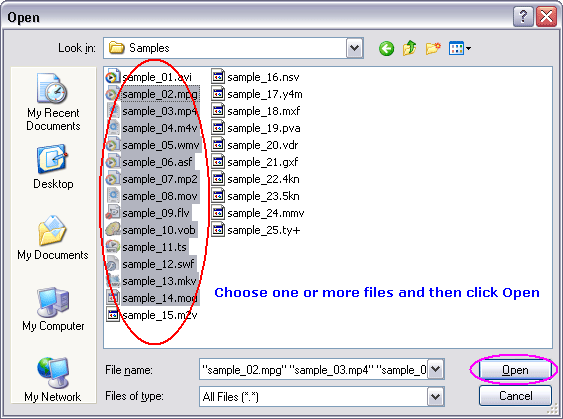
Choose one or more ASF files you want to convert and then click Open.
ASF to BMP Software will open ASF files and get file information
of the file such as width, height, frame rate, video bit rate, audio sample rate,
audio bit rate, audio channels, and then display the information of ASF file
at conversion list.
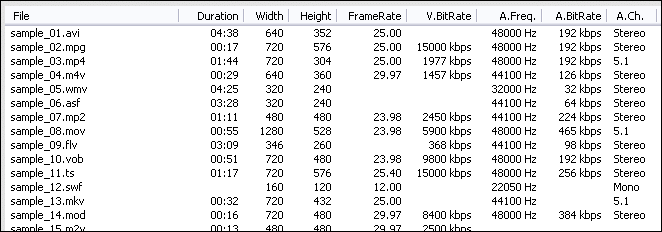
- Choose Output Format
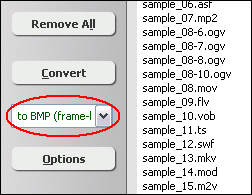
Click on combo-box of output format and then choose "to BMP (image sequence)".
- [Optional, for advanced user]
Set BMP Encoding Parameters
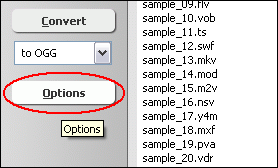
If you want to change BMP encoding parameters such as frame rate, video size,
aspect ratio, and so on, please click "Options".
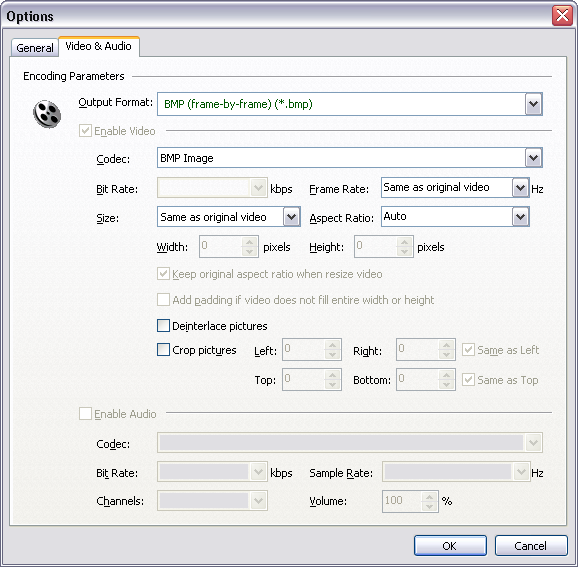
And then, switch to tab "Video & Audio" and choose "BMP
(image sequence)" at "Output Format", and then set options
for image encoding.
- Convert ASF to BMP
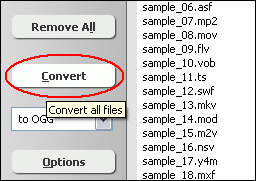
Click "Convert" to convert ASF to BMP sequence.

The software is converting ASF files to BMP.
- View and Browse BMP Files
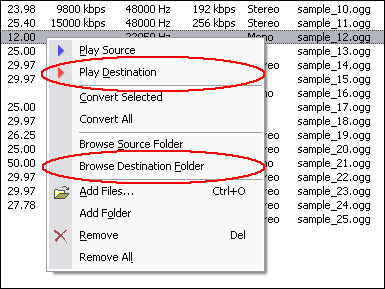
When conversion completes, you can right-click converted item and choose "Play
Destination" to view the first outputted BMP file; or choose "Browse
Destination Folder" to open Windows Explorer to browse the outputted BMP
files.
- Done
Top
ASF to BMP Software is 100% clean and safe to
install. It's certified by major download sites.

Convert ASF to BMP Related Topics:
|












